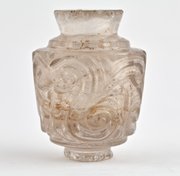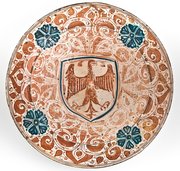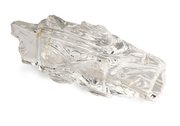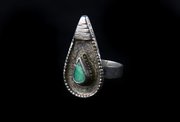
Oliphant
Museum of Islamic Art
- Title:
- Oliphant
- Production place:
- Sicily
- Date:
- 1000 - 1099
- Period:
- Norman
- Title:
- Oliphant
- Production place:
- Sicily
- Date:
- 1000 - 1099
- Period:
- Norman
- Material:
- Ivory, Copper alloy, Gilding, Black compound
- Technique:
- Gilding, Engraving, Inlaying, Carving, Hammering
- Dimensions:
- 11 × 45.6 × 10.4 cm
- Diameter:
- 10.4 cm
This spectacularly regal object is an Oliphant, a hunting horn that held a dual function: an effective communication tool used by hunters to signal each other or rouse prey; and a convenient drinking vessel transformed by simply closing the hole at the narrow end. Carved out from a single piece of elephant tusk, this horn forms a group of medieval Mediterranean Oliphants attributed to Italy – either the Amalfi coast or Sicily – based on stylistic similarities with inscribed pieces (rows of small running animals and winged creatures set within roundels, respectively). The latter attribution to Sicily supports the continued admiration of Islamic aesthetics practiced in the court workshops of Norman Sicily, in particular that of Fatimid Egyptian imagery seen on woodwork and pottery. At this time, the Fatimids also controlled the supply of raw ivory, which came from sub-Saharan Africa. Most certainly originally commissioned for a royal patron, this Oliphant has since remained in the possession of royal or historically important owners.


